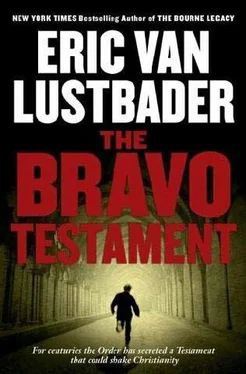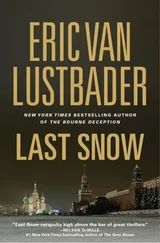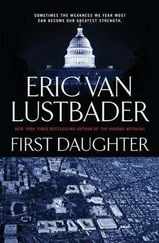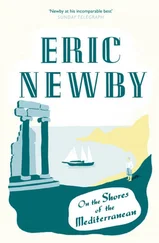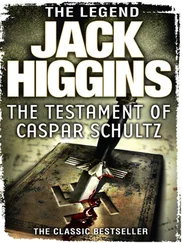All at once, he grasped Donatella's porcelain wrist.
"You're hurting me!" she gasped, but he did not relinquish his iron grip.
Slowly, he manipulated her wrist until her hand revealed what it held: the pendant at the end of the gold chain around his neck. "I told you, didn't I? What did I say?"
Donatella pouted, her fingertips caressing the seven-pointed purple cross. "But it's so beautiful."
Rossi knew that she meant powerful. She always said beautiful when she meant powerful.
"All the more reason to keep it hidden." Without taking his eyes off her face, he unwound her fingers so that the pendant disappeared beneath the opening of his shirt. "What do you think the consequences would be if our Mr. Shaw should catch a glimpse of it?"
Donatella swung around, her cat's eyes raking the baking street. "He'd know," she said in an unmistakable finality. "He'd know everything."
Outside, a fist of heat greeted Bravo rudely. After the chilly, metallic semidark of the vault, the light was blinding, but already he was wondering if he'd seen the man across the street before. He looked vaguely familiar, but Bravo couldn't quite place him.
Bravo moved off, and the man went into motion. Turning the corner, Bravo saw him reflected in a store's plate glass window, against a background of earthy Moroccan pottery and bright Turkish plates. It was his gait that gave him away, that brought back the woman's feline smile while her lover spoke to the lounging cop. Her eye contact had been deliberate-she was attempting to keep him from remembering her lover, who had now taken up the surveillance.
Or was he imagining it all? He wasn't paranoid, and he was no spy. Perhaps, neither was his father. But he didn't believe that, not really. The evidence was mounting, and now with this strange key in his possession he had become part of the game. If only he had a clue what the game was.
Emma had taken a suite in an exclusive boutique hotel not far from St. Vincent's while the brownstone was being repaired. Her bandages were smaller, and he could see that her hair had started to grow in. Martha, who had opened the door for him, was busy fixing lunch in the galley kitchen.
Bravo had spent fifteen minutes walking away from the hotel and then back again, ducking into a convenience store and suddenly out again, until he'd satisfied himself that neither the man nor his female partner was shadowing him. Only then had he entered the hotel.
He came in and kissed his sister on the cheek. "How are you?"
"Better." She smiled. "And you?"
"Ready to roll."
Keeping the smile on her face, she said, "You know, I get the feeling that you've been wanting to tell me something for days. Now that you're about to leave I really think you ought to tell me."
He looked around, but Martha, humming to herself, was oblivious. "It's about Dad. I…"
She cocked her head. "Bravo, this is me." She patted the sofa and sighed when she felt him sit down beside her. Feeling his warmth beside her, she said softly, "It's all right. Whatever it is, surely saying it will help. Have faith."
Bravo pressed his thumbs against his eyelids as if he could relieve the pressure building inside his head. "That day, Dad had something to tell me. It was important, at least it was to him. And I kept putting it off. I told him that we'd talk after dinner." Like a sprinter always gaining on him, that terrible day overtook him again, rendering him mute.
"Maybe what he had to say to you was important," Emma said. "But that's not the issue. You've got to go on, and you won't be able to do that unless you can forgive yourself." Emma put her arm around his shoulders. "Do you think you can do that?"
Bravo kept silent, knowing that she neither wanted nor required an answer. He simply listened, gave himself over completely to what she was saying. The truth was, despite whatever sibling-type fights they'd had when they were young, he'd always admired her, not just for her talents but for her innate intelligence.
"Before you turned your talents to risk management you were a scholar. The fact is, you're still a scholar, just as I'm still a singer. We're who we are, Bravo, whether or not we choose to believe it, because it's imprinted onto us at birth. By God? Yes, by God, through genetics. A risk manager is what you do, but that's not the same thing, is it? Dad understood that, even when you yourself lost sight of the fact."
Well, that was something, he thought as he walked out of the hotel. More than something. Right now, it was all he had.
Bravo traveled to Washington on the shuttle, checking the faces and demeanor of his fellow passengers both in the terminal and on the plane. He took with him the two keys-the seven-star key, as he'd come to call it, and the more pedestrian Medeco key to his father's apartment-and nothing more, except for the money he'd taken from his safety deposit box. He didn't know why he'd brought the money-a hunch, or a presentiment similar, perhaps, to the one that had brought his father to the Quai de Crenelle six months ago. One other thing: he also carried in his head a growing constellation of facts in search of a pattern.
The dense southern humidity rolling up the edge of the Chesapeake attempted to smother him the moment he strode out of the terminal. Halfway toward the rank of taxis, he stopped, as if abruptly unsure of himself. The sky was a uniform white, tinged with the palest blue lower down, away from the burning sun. Small eddies of a spendthrift wind stirred fistfuls of soot and candy wrappers into brief trembling spirals. Without warning, he turned and purposefully retraced his steps. Back inside the terminal, he walked past the huge plate-glass panels, watching the crowds coming and going. What he was looking for he could not at that moment have said, but like an animal with its snout to the wind he had responded to a peculiar prickling in the hollow between his shoulder blades. He went and got himself a cup of coffee, stood sipping it while he covertly watched the faces of passersby. Part of him felt ridiculous, but another, growing part of him, would not allow him to relax.
At length, satisfying some deeply buried instinct, he threw his paper cup into the trash and headed back out to hail a taxi.
Dexter Shaw had lived in a modest one-bedroom apartment in Foggy Bottom, that curious section of Washington between the White House and Georgetown. A century ago, the low-lying area was damp and swampy, owing to its proximity to the Potomac. Fog swirling in off the river often combined with a thick, greasy airborne mass, an industrial London-like smog emanating from the nearby Washington Gas and Light Company, Godey's lime kilns and Cranford's Paving Company. Nowadays, it was home to many legislators and a good place to network, which was, after all, the currency that greased the wheels of DCs curiously old-fashioned engine.
The apartment complex was in a huge redbrick building that took up most of the block on H Street. It was a modern, completely anonymous structure without ornament or interesting angle, form following function, typical of an unfortunate school of postmodern architecture.
Identifying himself to the uniformed doorman, Bravo took the elevator up to the twelfth floor, went down the blue-carpeted hallway. He slipped the Medeco key into the front door to his father's apartment. It didn't work. He tried again, wriggling it back and forth as if perhaps it needed only some small encouragement to fulfill its function.
He was about to try for a third fruitless time when he heard a voice behind him and, turning, found a small, dark-faced man coming toward him.
"I'm Manny-the super. Johnny-the doorman-phoned down to tell me." He offered his hand. "You're Mr. Shaw's son, ain't you?"
"That's right," Bravo said.
Читать дальше
